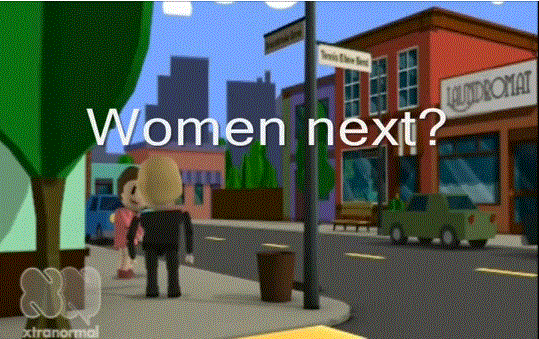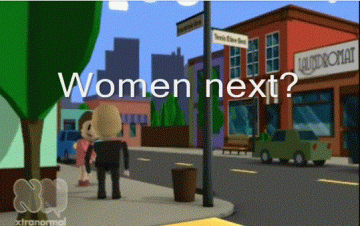

We want to hear your perspective! Write for Exponent II Blog by submitting a post here.
Get our new content delivered directly to your email inbox.
Our blog content is always free, but our hosting fees are not. Please support us.
Note: Comments that include hyperlinks will be held in the moderation queue for approval (to filter out obvious spam). Comments with email addresses may also be held in the moderation queue.
We want to hear your perspective! Write for Exponent II Blog by submitting a post here.
Our blog content is always free, but our hosting fees are not. Please support us.

Exponent II provides feminist forums for women and gender minorities across the Mormon spectrum to share their diverse life experiences in an atmosphere of trust and acceptance. Through these exchanges, we strive to create a community to better understand and support each other.
16 Responses
Some great facts and perspective presented here. Unfortunately, the portrayal of the male character as a reactionary ignoramus doesn’t really foster an environment of respectful dialogue. The characters themselves agree that it is offensive to assume men are so lazy they would neglect their priesthood duties if women were ordained. Ironically, the video’s creators apparently believe it is okay to portray the male protagonist as emotionally challenged and intellectually lazy, ready to grasp at any straw to continue the oppressive status quo. While the tactic might be effective for some audiences–the unassuming viewer will naturally be inclined to take the side of the informed, cool-headed female–it may further polarize the group with whom respectful dialogue is most needed.
I’m sorry if the video stereotypes men as unintelligent. That certainly was not my intention. When I made the video, my intent was to quote several of the objections to women’s ordination that I have heard, and model how someone who supports ordination might respond to these objections. All of the things the male character says are quoted from things I have heard male and female opponents of women’s ordination say. I admit that I consciously chose to use a male character to voice the objections because some of these objections seem more ironic too me when a man says them. For example, it is strange to me that men who are obviously dedicated to the church and would never leave it assume that men would quit church if women were ordained. It is also odd to me when a person who has chosen to be ordained to the priesthood (and who would never call himself power-hungry) accuses women who would like to also be ordained of being power-hungry.
I should have considered the risk that when I made a story with one male and one female it could be construed as an archetype for all men and all women. After all, I have noticed that discussions of Adam and Eve frequently digress into male and female stereotyping, so I should have anticipated that.
Thanks for the kind and thorough response. My intent was not to shift focus from your well-made video to what is really only a tangential issue with the presentation. This has the best (and most entertaining) content that I’ve encountered on this topic. [Incidentally, my older kids came by as I was re-watching it and expressed interest, so I showed it to them. As they rushed off to bed they agreed, “Those are some really good points.”] This is an important conversation, and I’m anxious for our Church to have it. And, clearly, I could also still use some work on effective, respectful dialogue.
I think this is presented in a way that reflects the reality of where we are in the “dialogue” about this. I didn’t view the male character as an ignoramus, but rather a reasonably realistic depiction of someone who has strong emotional reactions to the statements made by the female character, but hasn’t yet thought about the issue very deeply. The gender of the characters isn’t as important as the different levels that each character grasps the topic. The calm, forthright way that the female character meets the rather scornful comments is a useful way to model how to reply to such reactions.
I found this part especially to be most poignant:
“It’s hard to tell [if women really prefer a male-only priesthood] because it’s taboo for Mormon women to admit that they want the priesthood. Among Mormons, the priesthood has become so associated with manhood that asking Mormon women if they want to be ordained is like asking them if they want to be men. But the truth is that woman don’t have to be the same as men to have equal opportunities.”
“In the temple we are taught that women will become priestesses. I think we need to prepare ourselves by having mature, open conversations about women’s ordination.”
Love this April!
April, I want your autograph!!
JTP–
One of the many, many privileges of being a white guy is an invulnerability to stereotyping. The world is assumed to proceed from the point of view of white men, and they are not a category of people, but simply people, full stop. No one depiction or representation can possibly embody them.
It is those who are not white or male and who are therefore the OTHER who can be reduced to the characteristics that make them not just people. The aftermath of 9/11 and the treatment of people of middle eastern descent shows how ready we were as a country to stereotype wide swaths of people based on the actions of a very few.
But no one worried, when the Tsarnaeva brothers were identified as the primary suspects in the Boston marathon bombings, that people would start thinking all white guys were bombers–just all muslim immigrants (and indeed, there was a call to reconsider reforming immigration based on the acts of only two people). No one feared when Adam Lanza was identified as the murderer of 26 people that people would start thinking that all white guys were mass murderers–even though most mass murderers are white men. No one worried that the conviction of two young men (one white, one black) in Steubenville would make people think that all young men or even all football players are rapists, despite the frequency with which women are raped. No one even called attention to the race or gender of the Wall Street bankers and traders who destroyed the whole world’s economy, even though they were overwhelmingly white guys, and no one worried that people would start thinking that all white guys were selfish sons of guns who would willingly screw over everyone else in the world just to enrich themselves.
The diversity of white men is a basic premise of how the world works, something that is simply true about reality. Sure, some white men get mad when OTHER people (of color, women) discuss their privilege or lump them into a group–because, hey! They’re diverse, and everyone knows it! OTHER people are breaking the rules if they discuss any sort of common characteristic of white men because there aren’t any, aside from being white and male.
So relax, JTP. Sure, it might sting a little to see someone who looks like you being a stupid ass. But just as the world knows that the actions of one white man cannot possibly say anything about a group as diverse as white men, the world also knows that white men are far too diverse for a representation of one of them to say anything meaningful or true about all of them.
April, I thought you did a great job. As far as I was concerned, the only real problem was that the dress on the woman seemed a bit short–wasn’t sure any Mormon woman would really wear something cut so high. 🙂
April- I thought those were some good points in the video as well. It brought up some ideas that I hadn’t thought of which is probably the main reason I read posts on this website.
Holly- Are you THE Holly Welker? Your comments have been a source of much interest and entertainment for me this last week. I have read through many online articles that you have written. I’ve also read profiles, short bios and even some student reviews. Also, white men are not invulnerable to stereotyping. It happens all the time. To a certain degree, it happened in the video on this very page.
Jace–
They’re pretty invulnerable. Oh sure–people try to stereotype them, and those who object will shrug or scream it off–unless it’s something they think is funny, like maybe assertions that they’re lousy dancers or generally indifferent to fashion. They’ll point to their self-evident diversity and use it as protection against any attempt to reduce them to a narrow range of characteristics–aside from those promoted by patriarchy as the true definition of masculinity (brave, tough, emotionally reserved, possessing strong sex drives, etc). That’s why something like being lousy dancers or bad dressers is an acceptable funny “stereotype”–it’s just another way of saying the guys in questions are “real” men. And those things aren’t REALLY stereotyping, the discourse goes, because they’re true–or at least what should be true.
p.s. In other words, I’m not saying that white men are so uniquely powerful that no one can even think a thought or write a statement that stereotypes them. I’m saying that no attempt to stereotype white men–to judge all of them negatively or to treat all of them a particular way because of the behavior of one actual man or one representation, or to reduce them to just a few negative traits–is ever successful.
But all women have been judged and treated a particular way because of Eve, and all black people have been judged and treated a particular way because of Cain. As a result, the stereotyping is seen not only as the way things are, but the ways things God wants them to be.
And the world just doesn’t work that way for white guys.
April, this is brilliant!! Have you posted this to facebook? I sure hope so. This is a fantastic tool for all of us women who support women’s ordination and who are confronted with accusations of power hunger, etc.
Thank you for this!
That was an awesome video. Great work with multimedia tools!
I hope this goes viral 🙂
Mormon Women’s Ordination Conversation with Animation | The Exponent
Well done, April!
[…] and “wanting” the priesthood, if female, is particularly taboo. See this post or this one or this one or this one or this […]
[…] Mormon Women’s Ordination Conversation with Animation April 27, 2013 […]